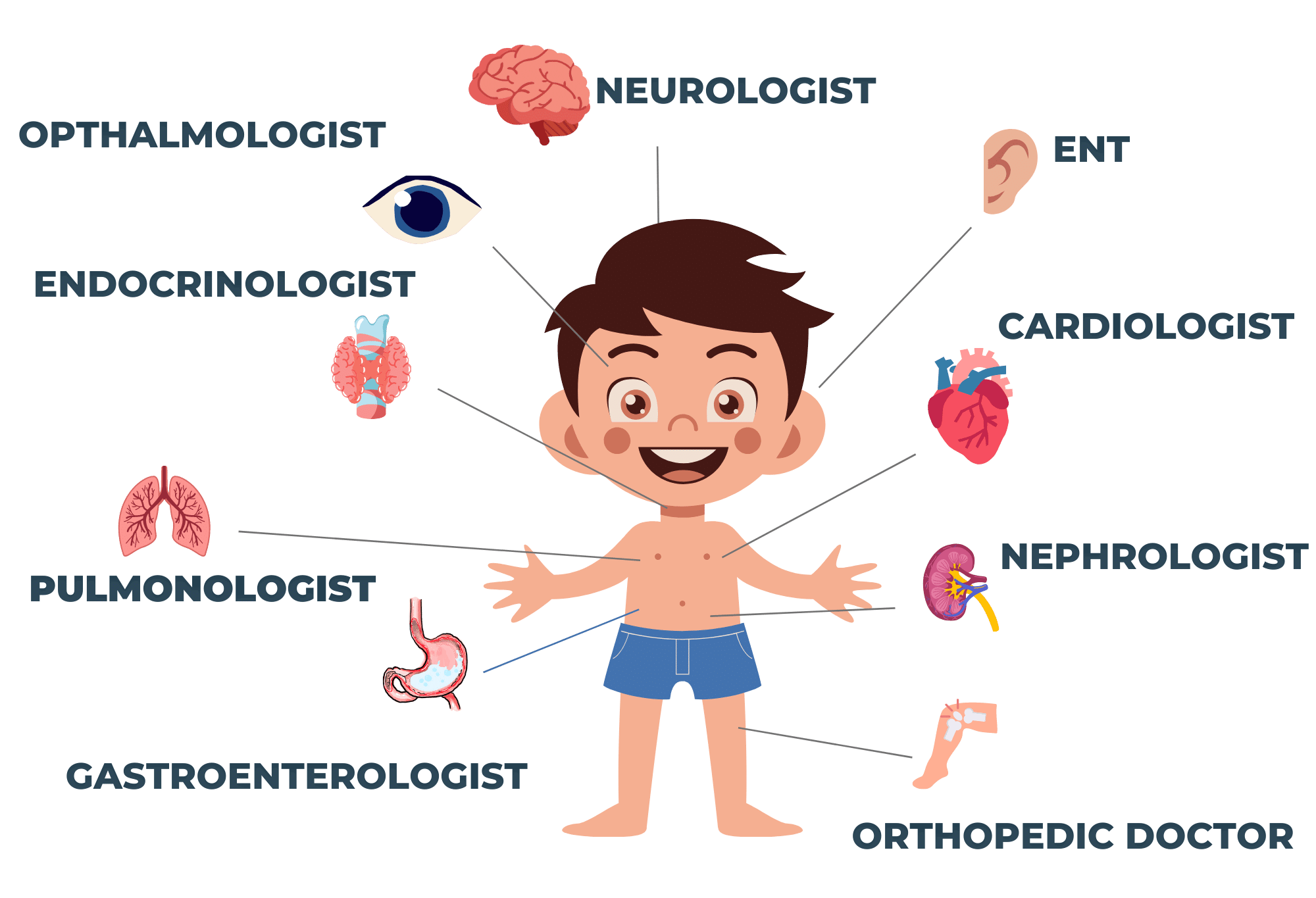We have information about Leigh Syndrome treatment options, creating a care team, clinical trials, and more.
Abby, USA
Are there treatments for Leigh syndrome?
Leigh syndrome therapies are focused on keeping children comfortable and slowing disease progression.
Specific types of Leigh syndrome have specific, targeted treatments. These include biotin-thiamine responsive basal ganglia disease, caused by mutations in SLC19A3 gene, which may be treated with high doses of thiamine and biotin, or pyruvate dehydrogenase deficiency, which may be treated with a ketogenic diet and thiamine.
Often, children have difficulties chewing and swallowing and in addition have an increased calorie requirement, and it can be difficult to take in sufficient calories by mouth. A feeding tube – also known as Gastrostomy Tube (G-Tube) – can be really helpful in improving calorie intake and reducing the time needed for feeds. While a G-tube can seem frightening and invasive, it is commonly done for children with many different health conditions in order to optimize growth and nutrition, especially during times of illness.
Some supplements may be suggested by healthcare professionals, such as
- Coenzyme Q10
- L-carnitine
- α-lipoic acid
- Creatine-monohydrate
- Biotin
- Thiamine
- Riboflavin
There is no definitive research that shows one medication or supplement to be superior to another, and so there may be some variability even among experts in the types of medications offered.

“Leigh syndrome is a tough, cruel disease, it doesn't give up, the little ones lose almost everything. Our life has transformed, but we are still together, our kids' siblings Amalia and Alejo grew up and learned with Ati and Beni, mom and dad, to deal with disability, physical limitations and the reorganization of family, social and school life caused by this disease.”
- Jorgelina Barral, ArgentinaMom to Atilio, Benito, Amalia, and Alejo. Atilio and Benito have Leigh syndrome.
Care Team
The care team for a person with Leigh syndrome may include multiple specialists.
Mito specialist is usually the main doctor who oversees a patient’s care and can make appropriate referrals to other specialists. A mito specialist is usually either a geneticist/metabolic doctor or a neurologist.
Geneticist/Metabolic doctors diagnose Leigh syndrome and provide counseling regarding inheritance patterns, treatment options, and potential implications. They contribute to research and collaborate with other healthcare providers to develop personalized treatment plans based on the patient’s specific genetic profile.
Please note that each individual will need to see specialists depending on their own symptoms, therefore you may not need to see all specialists shown here.

Primary Care Practitioner
The role of the PCP is to treat general conditions and to refer patients to hospitals and other specialists.
Dietitian and Nutritionist
Many children with Leigh syndrome are tube fed and are on special diets. Dieticians or nutritionists provide guidance and counseling on most optimal nutrition.
Physiotherapist
Physiotherapists help improve physical abilities, mobility, and strength through exercises, stretching, and specialized techniques. They may also recommend and assist with the use of mobility aids or orthotics.
Speech Therapist
Speech therapists help people improve their communication skills, addressing speech, language, voice, and swallowing issues through assessments, customized treatment plans, and therapy techniques.
Feeding Specialist
Feeding specialists evaluate and treat feeding and swallowing difficulties, addressing challenges related to oral motor skills, sensory processing, and behavioral aspects of feeding to ensure safe and adequate nutrition.
Psychologist
Psychologists help patients cope with their condition, manage emotional challenges, and support their overall well-being, as well as support the entire family.
Psychiatrist
Psychiatrists treat anxiety, depression, or other mental health disorders through therapy and medications.
Physical Medicine
Physical medicine and rehabilitation doctors (physiatrists) use a holistic approach that combines physical therapies, medications, and personalized treatment plans to improve patients’ quality of life and restore functional abilities.
Occupational Therapist
Occupational therapists may provide interventions to improve fine motor skills, sensory integration, self-care tasks, and adaptations to the environment.
Palliative Care
Palliative care doctors provide specialized medical care and emotional support focused on relieving symptoms, managing pain, and enhancing quality of life.
Leigh Syndrome and Infections
In some cases, Leigh syndrome can be triggered or worsened by infections, particularly respiratory infections like the flu or pneumonia. This is because infections can put additional stress on the body and exacerbate the symptoms of Leigh syndrome. People with Leigh syndrome may also be more vulnerable to infections because their immune systems are weakened by the condition.
While it is important to take reasonable precautions to prevent infections-such as diligent hand washing, and remaining up to date with all age-recommended vaccinations- it is not possible or recommended that you try to shield your child from any and all possible infections or germs in the environment. It is important to seek medical attention promptly if an infection does occur.

Ruby, USA

Amálie, Czech Republic
Leigh Syndrome and Emergencies
Please download a fillable PDF below that you can print out or save on your phone and have available in case of emergencies.
Additionally, your physician may provide a personalized letter to provide guidance to doctors in the emergency situation.
Are There Clinical Trials?
Clinical trials are research trials for new or existing medications that are designed to test whether or not, and how, a proposed treatment works. By the time a clinical trial is ready for enrollment, the proposed treatment will have been tested for safety. Participating in a clinical trial may offer a chance to try a new or developing Leigh Syndrome therapy, and it is a way to contribute to clinical research.

Josie, USA
Caring For A Loved One With Leigh Syndrome
Caring for a child or loved one with a life-limiting condition like Leigh syndrome can be challenging. Lower stress and the risk of developing depression or anxiety by:
- Connecting with support groups familiar with Leigh syndrome
- Practicing self-care
- Asking for help
- Talking to a mental health professional if necessary

Will and Delta, USA
We thank the authors and contributors who helped with the development of this page: Kasey Woleben, Sophia Zilber, Courtney Boggs, Shamima Rahman, FRCP, FRCPCH, PhD, Ibrahim Elsharkawi, MD, Breanna Lima Martinez, MS, CGC, Melinda J. Burnworth, PharmD, BCPS, FASHP, FAzPA, Titilola M. Afolabi, PharmD, BCPPS, Peter McGuire, MD, Krisztina Ferencz, Rachel Kramer, PhD.



